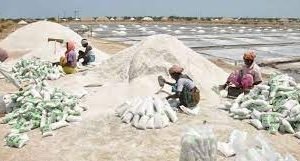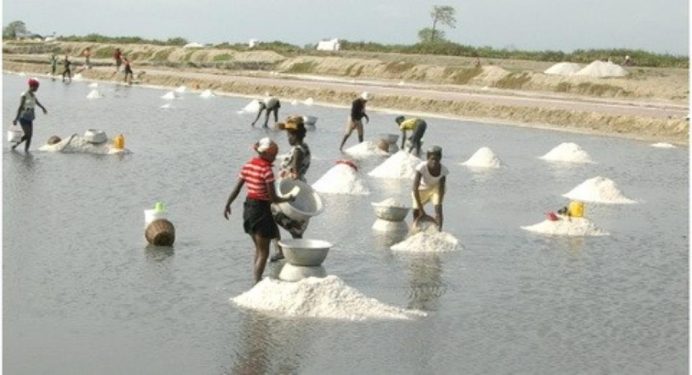Over the years, and we are talking hundreds of years, salt has served as a natural blessing to the entire people that now make up Ebonyi State. Merits come with thorns, thus it is expected that salt would pose some challenges to the indigenous of Ebonyi State. The next question that will come to mind is how? This is what we intend to do here, to show you how salt has been of great significance to the Ebonyi people and people outside Ebonyi, and also how salt has disadvantaged Ebonyi people also. Basically, we would walk you through how salt is gradually taking over Ebonyi water bodies.
Salt is a universal condiment in the whole world. Most of the salt you eat comes from seawater or is mined from deep within the earth. Hence, the reason it is mostly seen in this part of the eastern state. Seawater is diverted to a shallow evaporation pond connected by man-made canals. The pond fills with water, and through the natural process of evaporation, the water slowly disappears, leaving the salt to be harvested.

Therefore, Ebonyi has large deposits of salt in Ikwo, Uburu, and Okposi in Ohaozara, Amasiri and Abakaliki area. Ebonyi is not called “Salt of the nation”, its huge salt deposit found in commercial quantity in Okposi, Enyigba and Uburu salt lake stand out. The lake has been the raw material source, providing brine with which women in the community have been producing salt for over a century. It is one of the states that the federal government would benefit from in order to diversify the nation’s economy.
The image of an Uburu woman carrying a bowl of locally produced salt welcomes you to the town of Uburu a community in Ohaozara Local Government of Ebonyi State, Nigeria.
The traditional methods of salt production in Ebonyi State have continued in “Okposi Okwu” for about 400 years. The lake that supplies the brine was discovered almost immediately after the area now known as “Okposi Okwu” which is inhabited. Two hunters (Ekwna Chita and Uta Anoo) discovered the lake and made their finding public when they found out that they could not quench their thirst with what they thought was ordinary water.
Top Tourists centers in Ebonyi State
No matter how crude the method, salt preparation is not a craft but a scientific process. Despite the tasking nature of the salt-making process, it has remained an exclusive activity for women. Boiling of brine to extract salt poses a big problem as Okposi is not a wooded area. They had to build an industry close to the lake and taught the local women new production techniques, including the use of “alom” to effect sedimentation of dirt before decantation and ultimate filtration.
From fetching the brine for sand and dirt, to boiling water to evaporating hat level, a lot of energy is invested. Likewise, the resources as the evaporation procedure can take a whole day to get a sizeable commercial quantity and this consumes a lot of firewood. Other flammable materials are sourced from surrounding villages and beyond. Many years ago, a particular type of pot “ore ohu” was used as an evaporation melting pot. Later, this gave way to kerosene tins, but now, enamel basins are the norm.
Before the idea of packaging came into existence, baking of salt was the only option for the marketing of the product. As in the case of boiling, ceramics were used for this purpose, but now, metal bowls dominate because they are more durable and more convenient.
There is an industrial hut where these activities are done and it is called “Ewe” and it is owned individually. The moment a new bride completes her honeymoon, she is initiated into salt-making activities as a practice by her mates. Her more elderly friends and relations decide on a day when they would fetch as many pots of the brine as it is the only thing used in making puddle with which the mud part of the “Ewe” would be built.
The problems salt pose to its host communities
Despite its widely diversified essence, salt has made survival quite a difficult thing and has undoubtedly caused an unbearable living for indigenous of Ebonyi state who reside close to some river, lake, or pond areas. One of the advantages of residing close to a waterside is the privilege of consistent availability of excessive water for domestic use. But the reverse has continually been the case of these people because of the immeasurable essence of salts available in those areas and they are affected through the following ways:
Top five Indigenous Ebonyi dishes
One, these people are faced with the challenge of losing their farmlands to salt essence. A surface covered with a large salt substance does not yield good productivity during harvest. The salt that resurfaces on the body waters spreads across the swamps or farmlands surrounding it, infecting the area with infertility of the soil in which crops struggle to grow.
Two, people living in such areas still have the need to search for good drinking water rather than making use of what they have available. Salt is an essential ingredient in the human body as its supplies the body with sodium. But too much sodium in the diet can lead to high blood pressure, heart disease, and stroke. It can also cause calcium losses, some of which may be pulled from bone.
A surface where salt is found is a ground that is fragile, not strong enough to sustain foundations of buildings located in the areas. This might lead to building collapses. Places such as Ume-Igbudu, Azuebonyi, and Inyimagu all in Ikwo, Ebonyi State have had their shares of construction failures.
Follow us on Twitter
Post Disclaimer
The opinions, beliefs and viewpoints expressed by the author and forum participants on this website do not necessarily reflect the opinions, beliefs and viewpoints of Anaedo Online or official policies of the Anaedo Online.

